Paul Schott Stevens has been president and CEO of the Investment Company Institute since June 2004—the longest-serving chief executive in ICI’s history. Here are some highlights of his tenure.
1993–1997
1993–1997
Paul Schott Stevens serves as general counsel for ICI. He spearheads important industry initiatives such as development of best practices on personal investing, expansion of ICI’s programs for fund directors, and advocacy on the National Securities Markets Improvements Act of 1996. He describes his work on blue sky regulation as his greatest accomplishment and expresses his pride in leading the effort to expand and build out ICI’s Research Department.

Paul Schott Stevens as ICI general counsel in 1993
ICI represents more than 9,300 funds with more than $8 trillion in assets and serving almost 90 million investors.
January 2004
SEC adopts its compliance rule.
May 2004
The Independent Directors Council (IDC) is formally launched.
May 19, 2004
Stevens speaks at ICI’s General Membership Meeting as president-elect.
“I join the Institute during a time of formidable challenges and extraordinary change. But we are not strangers to either. America’s mutual funds have thrived because they have been agents of change—changing the way Americans save and invest.”
June 1, 2004
Stevens returns to ICI as president.
June 15, 2004
In his first speech as president of ICI at the National Press Club, Stevens addresses the road ahead for US mutual funds as the industry recovers from the challenges of the market timing and late trading scandal. He calls for a rededication to fiduciary responsibility.
“For America’s mutual funds, the road ahead…will demand that we work even harder to maintain the framework of accountability to our investors. It will demand that we always accord them the fair and equal treatment they expect. It will demand that we continue to inform them fully and meaningfully about their fund investments. Most importantly, it will demand that we be unflinchingly loyal to the interests of the investors whom we serve, and deeply conscious of the obligations we assume as fiduciaries on their behalf.”
2004
Stevens joins board of ICI Mutual Insurance Company, and remained a member of its board and executive committee through 2020.
2005
ICI launches a new Chief Compliance Officer Committee to aid effective implementation of the mutual fund compliance rule.
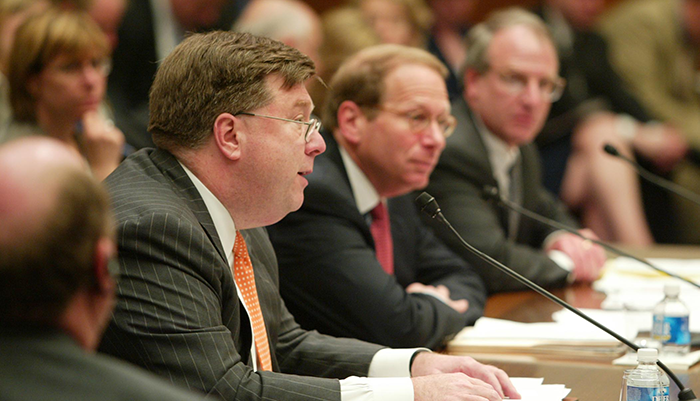
Stevens testifies at a May 2005 House Financial Services subcommittee hearing on mutual fund regulation.
May 2005
Stevens testifies before the Capital Markets Subcommittee of the House Financial Services Committee, stressing the need for regulation that considers the competitive realities of the marketplace.
“Our legal and regulatory system has worked as designed to identify, correct, and prevent misconduct, and to hold investors harmless. Strong, corrective market forces have been at work as well. The result has been to sustain the historically high degree of public confidence in mutual fund investing—and thus to preserve to average Americans an indispensable tool to achieve their long-term financial objectives.”
October 2005
ICI hosts the International Investment Fund Association’s annual conference in Washington, DC.
2006
May 17, 2006
The Tax Increase Prevention and Reconciliation Act is enacted. In outreach to policymakers, ICI consistently champions the role that effective tax policies play in promoting a stronger savings culture. The act extends favorable capital gains tax rates and allows conversion of traditional IRA balances to Roth IRAs.
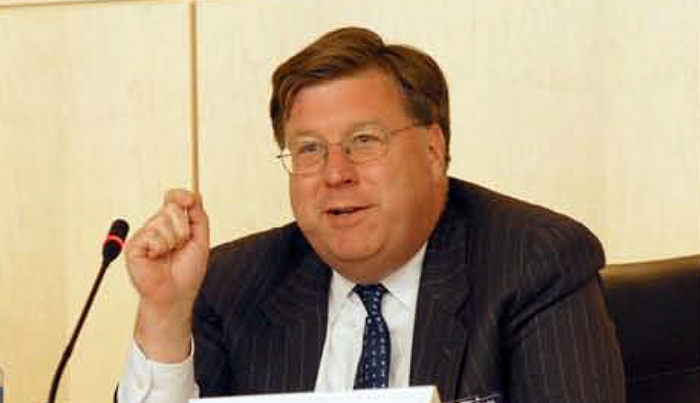
Stevens announces an ICI initiative to link the power of the internet to the information that mutual fund investors most need and use.
June 2006
Stevens urges the SEC to consider reforms that will “bring fund disclosure into the 21st century.” ICI envisions a new approach to disclosure that would harness the power of the internet to develop a clear, concise disclosure document that fund investors will find useful.
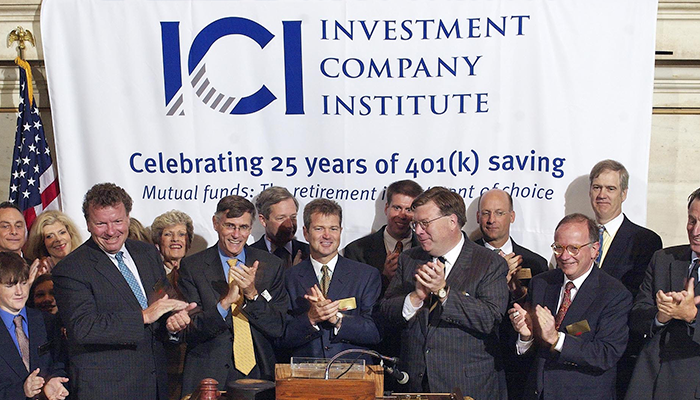
June 2006
ICI Chairman Martin L. Flanagan, Stevens, and other ICI Board of Governors members celebrate the 25th anniversary of the 401(k) plan by ringing the opening bell at the NYSE.
August 17, 2006
The Pension Protection Act (PPA), making higher limits for 401(k) and IRA contributions permanent, is enacted. ICI strongly advocates for the measures in the PPA that promote more effective saving through automatic enrollment, improve default investment options, and increase access to investment advice.
2007
May 2007
An ICI economic analysis contributes to a NYSE decision to amend a proposal that would have ended discretionary broker voting in uncontested elections for fund directors. ICI’s analysis leads the NYSE to recognize the extra burden placed on funds and amend its proposal to permit brokers to continue to vote fund shares.
October 24, 2007
ICI promotes sound default investments for 401(k) plans by mounting a vigorous defense of the DOL’s final regulations for qualified default investment alternative (QDIAs), which incorporate the ICI-endorsed proposal that default investments should include lifecycle and balanced funds and managed account programs.
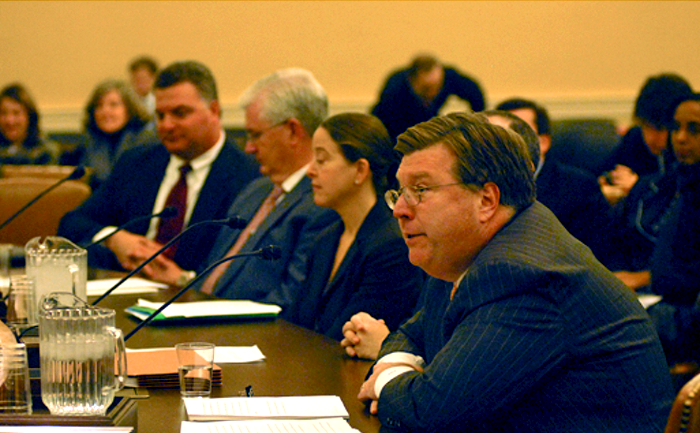
Stevens testifies before the House Ways and Means Committee in October 2007, hailing the success of the employer-based 401(k) system and supporting appropriate disclosure reform.
October 30, 2007
In testimony before the House Ways and Means Committee, Stevens advocates for workers to receive a clear, concise summary for each investment option available under a 401(k) plan. ICI’s advocacy ultimately achieves sensible fee disclosure, making disclosure more useful for participants and less burdensome to the industry.
“Any discussion of the 401(k) system should begin by recognizing how successful 401(k) plans have been in helping Americans save for retirement.”
ICI represents more than 13,000 funds with more than $11 trillion in assets and serving almost 90 million investors.
“We can face the challenges that lie ahead with all the more confidence if we build on the very best of our history and fiduciary tradition.”
2008
ICI strongly supports SEC proposals to make it easier to form index-based and fully transparent actively managed ETFs. ICI’s board also creates a Standing Committee on Exchange-Traded Funds.
January 25-29, 2008
Stevens hosts the first of four ICI Board of Governor’s winter meetings in his hometown of New Orleans, Louisiana.
April 2008
Stevens testifies before DOL on disclosure rules for the 401(k) marketplace.
July 2008
ICI undertakes the largest study yet of funds’ proxy voting, analyzing more than 3.5 million proxy votes cast by 160 of the largest fund families. As Stevens argues, the findings are clear: “The data show how funds use their proxy votes to promote the interests of their shareholders.”
The Financial Crisis of 2008–September through November, 2008
Leading in a time of turmoil
September 2008
Lehman Brothers declares bankruptcy and the Reserve Primary Fund fails to maintain $1.00 NAV.
September 16–22, 2008
ICI’s board holds series of emergency meetings; appoints Vanguard Chairman John J. Brennan to head a senior executive group to work with Treasury, Fed, and SEC to contain fallout from Reserve Primary Fund. ICI holds daily calls with money market fund members.
October 2008
ICI steps up market monitoring for the Fed, SEC, and Treasury, and facilitates direct member contact with regulators. ICI also works with Treasury to limit the Temporary Guarantee Program for Money Market Funds and to clarify details for ICI members. ICI works with the IRS and SEC for clarification on tax issues, affiliated transactions, and valuation, and with Congress to ensure that the Emergency Economic Stabilization Act does not compromise, limit, or impose excessive premiums on the Treasury guarantee program (TARP).
October 21, 2008
In written testimony to House Education and Labor Committee, ICI argues that it would be a “grave mistake” to use recent market events as an excuse to dismantle current retirement system.
November 2008
Working with ICI’s board, Stevens launches the Money Market Working Group (MMWG), a task force of senior industry executives to recommend changes to help strengthen the money market and improve the operation and regulation of money market funds.
December 19, 2008
Stevens addresses a Newsmakers forum at the National Press Club in Washington, DC, on retirement security during a recession. He releases new research in which Americans indicate that they believe in the 401(k) system and reject proposals to change the tax or investment approach to 401(k)s.
November 2008
Nearly 15 years of ICI work on the SEC’s summary prospectus rule pays off for investors and funds. Through novel research, comment letters, and advocacy, ICI helps refine the proposal to allow funds to voluntarily provide investors with a summary prospectus while making the full prospectus and other fund documents available online.
March 17, 2009
The ICI Board of Governors endorses the MMWG report, which recommends new standards for credit quality, liquidity, and maturity, and calls for immediate implementation of new regulatory and oversight standards for money market funds.
July 17, 2009
In testimony before the House Financial Services Committee, Stevens offers suggestions for the Obama administration’s goal of strengthening the SEC.
November 18, 2009
The ICI Education Foundation (ICIEF) announces its first set of microgrants to Washington, DC-area organizations to advance investor education.
“We are pleased to launch this grant program at such a crucial time in our country’s economic history, when the need for investor education has never been more apparent or widespread.”
March 30, 2010
In a unanimous decision in Jones v. Harris Associates, the US Supreme Court endorses the legal framework used by courts to assess claims of excessive fund advisory fees (the Gartenberg approach). The court’s decision reflects the economic analysis and insights into board functions that ICI and IDC provided in amicus curiae briefs. The court relies on ICI’s research in describing the industry structure and its interplay with the Gartenberg approach, and it is notable that ICI’s Investment Company Fact Book is the only nonlegal source cited in the Jones opinion.
May 6, 2010
The Dow Jones Industrial Average plunges about 600 points in less than 10 minutes and quickly rebounds—the “flash crash.” Through extensive internal data analysis, ICI makes a compelling case that inefficiencies in current US market structure, and not specific features of ETFs, are responsible for the disproportionate impact of the flash crash on ETFs.
July 21, 2010
The Wall Street Reform and Consumer Protection Act (Dodd-Frank) is enacted. As this sweeping legislation is being developed, ICI works closely with lawmakers to help mitigate any adverse effects for funds or their shareholders.
November 2010
ICI files a comment letter on the SEC’s proposal to amend Rule 12b-1, the rule governing fund distribution fees. ICI’s cost-benefit analysis shows that the SEC’s analysis understated the likely costs of the proposal’s implementation, while overstating its benefits. The SEC’s proposal is never adopted.
December 22, 2010
With overwhelming bipartisan support, Congress enacts the Regulated Investment Company Act (RIC) Modernization Act. This Act benefits shareholders by making funds more efficient and streamlines and updates technical tax rules. ICI works with Congress to move a bipartisan bill.
2011
2011
ICI works to ensure that the myriad rules of Dodd-Frank do not have harmful or unintended consequences for funds. For example, ICI analyzes the legal implications and economic variables that should go into deciding whether a particular firm poses risk to the overall financial system. ICI’s analysis underpins its view that designation as a “systemically important financial institution,” or SIFI, by the new Financial Stability Oversight Council (FSOC) is inappropriate for funds—including money market funds—or their advisers.
June 24, 2011
Stevens testifies before a House Financial Services Committee subcommittee on concerns over how FSOC will exercise its authority under Dodd-Frank to designate nonbank financial institutions as SIFIs.
July 22, 2011
In Business Roundtable et al. v. SEC, the United States Court of Appeals for the District of Columbia Circuit vacates the SEC’s proxy access rule. ICI and IDC file a joint amicus brief, challenging the rule’s application to registered investment companies. The judges agree with ICI and IDC that the SEC failed to adequately evaluate the rule’s costs and benefits.
October 11, 2011
ICI launches ICI Global—the first industry body exclusively advancing the perspective of global investment funds—to carry out ICI’s international work. ICI Global is headquartered in London, with an office in Hong Kong following in 2013.
ICI represents more than 14,000 funds with more than $13 trillion in assets and serving more than 90 million investors.
2012
FSOC adopts a final rule and interpretive guidance concerning its authority to designate nonbanks as SIFIs. ICI expresses its firm view that SIFI designation would not be appropriate for funds, as they do not present the risks that the designation is intended to address.
2012
Commodity Futures Trading Commission (CFTC) votes to adopt amendments to its Rule 4.5, which means that advisers to certain registered investment companies already regulated by the SEC are also regulated by the CFTC. ICI and the US Chamber of Commerce file a legal challenge. Though the suit ultimately does not prevail, ICI’s principled stand influences the direction of the CFTC’s harmonization rules and the substituted compliance approach it eventually adopts.
June 21, 2012
In testimony before the Senate Committee on Banking, Housing, and Urban Affairs, Stevens presents data vividly illustrating how the 2010 money market fund reforms, such as new minimum liquidity requirements, had a “transformative effect on money market funds.”
June 7, 2012
Stevens speaks on the success of 401(k)s at Town Hall Los Angeles.
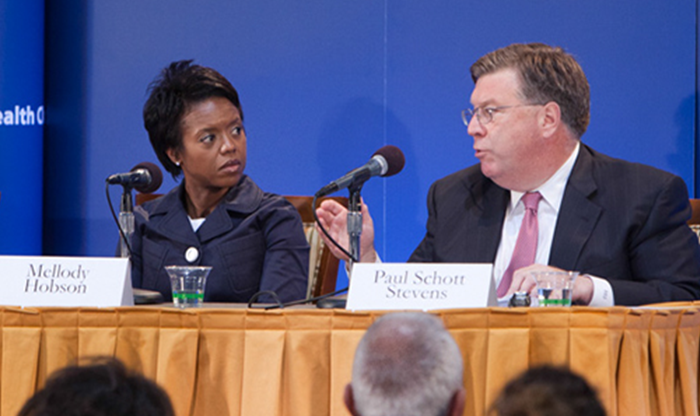
ICI Governor Mellody Hobson, president of Ariel Investments, and Stevens discuss “The Future of Retirement” at the Commonwealth Club of California on September 27, 2012.
September 27, 2012
Stevens joins ICI Governor Mellody Hobson, president and co-CEO of Ariel Investments, in an appearance at the Commonwealth Club of California in San Francisco to discuss ways to improve Americans’ retirement prospects.
October 2012
ICI Global joins ICI, the European Fund and Asset Management Association, the Institutional Money Market Funds Association, and the Investment Funds Institute of Canada in convening an international summit on money market funds in Brussels to help policymakers and market participants better understand the global money market fund industry.
Late October 2012
NYSE closes its markets as Hurricane Sandy bears down on New York. ICI’s operations and markets experts provide critical services to constituents during and after the market’s two-day closure—the longest weather-related interruption of the NYSE since 1888.
2013
2013
ICI and ICI Global continue to closely engage with regulators to share concerns and suggestions about how to implement the Foreign Account Tax Compliance Act (FATCA) of 2010. This work contributes to the Treasury and IRS finalizing the FATCA regulations, signing numerous intergovernmental agreements (IGAs), and granting a six-month delay for FATCA implementation.
May 2013
ICI Global’s Hong Kong office opens.
June 26–27, 2013
In Hong Kong, ICI Global hosts its first (of four) Global Retirement Savings Conferences, featuring speakers, panelists, and participants from around the world.
September 18, 2013
Stevens testifies before a House Financial Services Committee subcommittee on the money market fund rule proposal.
October 10, 2013
Steven testifies before the Senate Committee on Banking, Housing, and Urban Affairs on the danger that a default of the nation’s public debt would pose to financial stability and economic growth.
October 21–23, 2013
ICI hosts the International Investment Fund Association’s 27th annual conference in New Orleans, Louisiana.
December 2013
Regulations proposed to implement the “Volcker Rule” provision of Dodd-Frank could have negatively affected US-registered funds and their foreign counterparts, contrary to Congressional intent. ICI and ICI Global explain those effects, and the final regulations adopted in 2013 considerably narrow the universe of funds subject to the rule. In ensuing years, ICI engaged on remaining issues for regulated funds, including work to resolve the “banking entity” issues for ICI and ICI Global members.
“As we confront the twists and turns presented by the future, the interests of fund investors must continue to be our guide.”
2014
Much of ICI’s work in 2014 and the following two years is focused on explaining why SIFI designation is inapposite for regulated funds and their managers, urging regulators to take an activities-based approach to risk mitigation in asset management, and providing policymakers with industry information and expertise.
“If the FSOC designates mutual funds as SIFIs, it will impair the single best tool for individual investors—used by 90 million Americans saving for retirement and education—and harm capital markets. Designated funds and their investors would bear higher, unnecessary costs and could be put on the hook to bail out failing institutions in the next financial crisis.”
April 2014
The ICI Retirement Summit held in Washington, DC, examines a range of economic models focusing on the retirement readiness of current and future generations of Americans.
“Today’s event is truly special. As far as we know, no other conference has brought together such a diverse group—that’s including top academics, industry experts, researchers, policymakers, and the press from all sides of the issue—to examine retirement preparedness in America in such depth and detail.”
July 23, 2014
The SEC adopts sweeping changes to the rules that govern money market funds, building upon the changes adopted by the SEC in 2010 and capping a six-year-long effort in which ICI and its members play leading roles. The outcome preserves money market funds as viable investment vehicles for individuals and institutions alike.
“Over the course of almost six years, ICI did not flag or falter in pursuit of the twin goals we had identified from the outset—strengthening money funds against the most adverse market conditions, while preserving their manifold benefits.”
October 2014
Stevens is elected as chairman of the International Investment Funds Association, the global organization representing ICI and all of ICI’s counterparts around the world. He served in the role for three years.
“Though the two-year time frame for implementation granted by the SEC sounds like a long time, you know as well as I do that when it comes to implementation of a 900-page rulemaking that touches just about every part of a money market fund’s organization, every second counts.”

Past ICI chairmen gather with Stevens at the 75th Anniversary Leadership Dinner, held at Mount Vernon in May 2015. From left: James S. Riepe, John F. Cogan Jr., F. William McNabb III, Paul Schott Stevens, Edward C. Bernard, John J. Brennan, Gregory E. Johnson, and Paul G. Haaga Jr.
2015
ICI celebrates its 75th anniversary.
2015
ICI provides thoughtful perspective—through research, policy suggestions, and participation in congressional and regulatory hearings—to leaders in the United States and internationally about the consequences of funds’ SIFI designation for the average investor. And in the debate over financial stability, 2015 sees a major shift away from the prospect that a regulated fund or its manager could be designated as a SIFI.
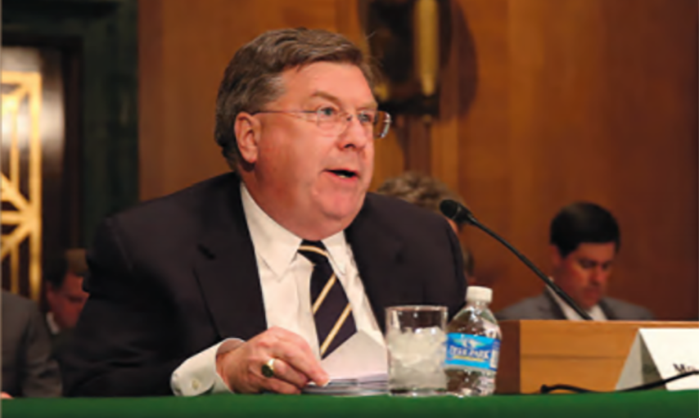
Stevens testifies in March 2015 before the Senate Banking, Housing, and Urban Affairs Committee on why the FSOC’s process for designating firms as systemically important lacks transparency and accountability.
March 25, 2015
At a hearing held by the Senate Committee on Banking, Housing, and Urban Affairs, Stevens testifies about the lack of transparency and accountability in the FSOC’s SIFI designation process.
April 2015
The 2015 ICI Retirement Summit is held in Washington, DC.
April 2015
The Global Retirement Savings Summit is held in Tokyo.
April 21, 2015
Stevens speaks about the critical role of capital markets at American Chamber of Commerce of Japan.
July 8, 2015
Stevens testifies before the Senate Banking Committee to educate members of Congress on the fundamental flaws in the work of the Financial Stability Board (FSB).
July 2015
ICI begins public comments on a proposal by the DOL to redefine what counts as a fiduciary relationship under ERISA. A cost-benefit analysis by ICI identifies real gaps in the DOL’s impact analysis.
September 10, 2015
Stevens testifies on the DOL’s proposed fiduciary rule, explaining that the rule as proposed would harm retirement savers by drastically limiting their ability to obtain the guidance, products, and services they need to meet their retirement goals.
ICI represents more than 17,000 funds with more than $19.5 trillion in assets, and serving more than 95 million shareholders.
“Fiscal year 2016 has been especially busy [on ICI’s commitment to sound, investor-centered rulemaking]. ICI filed 111 comment letters, totaling more than 1,600 pages, in the past 12 months. One-third went to the SEC, and one-quarter to various international bodies. I believe the number and variety of regulatory issues we addressed in the past year surpass any in our history.”
2016
ICI leans into its battle for shareholder interests in the online delivery debate after Rule 30e-3—part of a broader rulemaking package designed to modernize fund reporting—is met with stiff opposition from a determined pair of opponents: the paper industry and the top vendor delivering shareholder reports on behalf of brokers.
2016
ICI continues to weigh in on efforts by DOL to redefine the term fiduciary, as well as efforts by a number of states to establish state-run retirement accounts that would effectively sidestep protections provided by ERISA. After the final rule is released, the Institute begins working with members to meet the aggressive timetable and goals set up by the DOL.
January 2016
ICI publishes How America Supports Retirement: Challenging the Conventional Wisdom on Who Benefits, a groundbreaking book where ICI’s Peter Brady demonstrates that the full system of government support for retirement is progressive and shows that tax proposals to limit or fundamentally change tax deferral could actually make government’s support for retirement less fair. The book was subsequently published in Mandarin by the Asset Management Association of China and in Japanese by the Investment Trusts Association of Japan.
January 13, 2016
ICI shows the SEC why its proposed “bucketing” requirements—the liquidity risk management rule’s asset-classification provisions—would be problematic, challenging, and expensive to implement and identifies operational impediments to using swing pricing in the United States. The final package of reforms, adopted in October 2016, addresses many of ICI’s concerns.
September 26, 2016
Stevens testifies at the Monetary Policy and Trade Subcommittee of the Financial Services Committee on the FSB’s implications for US growth and competitiveness.
2017
2017
ICI takes on the new possibilities for the fund industry that come with a change in administration and a new Congress, and welcomes the opportunity to reassess the numerous regulatory initiatives facing the industry. Stevens calls on the SEC to help funds serve investors by modernizing communications with fund shareholders; preserving the fundamental framework of fund regulation; ensuring that all investors have access to financial advice that puts their interests first; and permitting funds to continue to use the most advanced investment tools and techniques.
ICI informs the SEC of the costs and potentially harmful consequences of its recently-adopted regime for managing liquidity risk and advocates for a modern regime for funds’ use of derivatives.
ICI’s advocacy helps inspire a thorough reexamination of the role and processes of FSOC.
2017
ICI pursues multiple opportunities to inform and shape an emerging academic theory—the “common ownership” theory—with troubling implications for registered funds and their shareholders.
March 22, 2017
An ICI-led, multiyear industry effort to shorten the settlement cycle for a range of securities from trade date plus three days (T+3) to two days (T+2) is enacted.
April 2017
In findings that run counter to the “retirement crisis” narrative often found in academia and the media, ICI releases new analysis of tax data showing that American workers are able to preserve their standard of living after they claim Social Security.
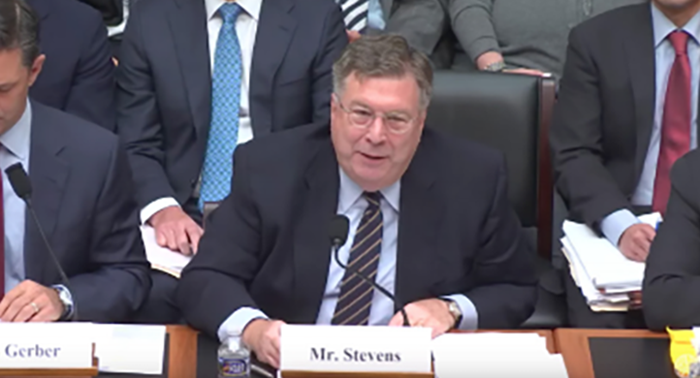
Stevens testifies at a hearing—“Legislative Proposals to Improve Small Businesses’ and Communities’ Access to Capital”—before the House Capital Markets, Securities, and Investment Subcommittee on November 3, 2017.
November 3, 2017
Stevens testifies before a subcommittee of the House Financial Services Committee, detailing how closed-end fund modernization would enhance financing for the US economy while maintaining stringent protections for investors.
December 20, 2017
ICI’s persistent efforts in supporting tax-deferred retirement savings see fruitful resolution when Congress passes the most significant tax bill in three decades. The Tax Cuts and Jobs Act of 2017 preserves the tax-deferred treatment of retirement savings contributions.
“Congress has once again affirmed its strong support for the voluntary, employer-based system of tax-deferred savings for retirement. The incentives this system offers draw strong support from across the nation because they have encouraged and enabled millions of Americans to save for retirement.”
2018
May 16, 2018
Stevens testifies in a hearing before the House Committee on Education and the Workforce that Congress should permit electronic delivery as the default method for disclosure (while still allowing participants to opt for paper), thus enhancing the effectiveness of ERISA communications and producing significant cost savings for investors.
May 2018
The Economic Growth, Regulatory Relief, and Consumer Protection Act is passed. ICI had worked with member firms to identify areas of closed-end fund regulation—particularly offering rules—that would benefit significantly from reform, and to communicate the need for reform to congressional staff.
June 5, 2018
SEC adopts Rule 30 e-3, permitting US‑registered funds to deliver shareholder reports online to satisfy their disclosure obligations. ICI battled a coalition of paper producers and their allies who lobbied to prohibit the SEC from moving forward with any e-delivery rule.

June 20, 2018
Stevens testifies before the Financial Services Committee at a hearing on the need to strike the right balance between protecting investors and markets on the one hand, while preserving efficiency, promoting capital formation, and spurring economic growth on the other.
June 28, 2018
ICI’s ongoing advocacy on the SEC’s 2016 liquidity rulemaking convinces the SEC to eliminate public reporting of bucketing information, one of the most concerning aspects of the original framework.
October 2018
ICI continues its efforts to advance Volcker Rule reforms by explaining how regulators can avoid impeding the activities and investments of ICI member funds while still achieving the intended purposes of the rule.
September 25, 2019
The SEC adopts Rule 6c-11, known as the ETF rule, finally enabling most ETFs to operate under the Investment Company Act of 1940 without having to apply for exemptive relief. One of ICI’s long-sought priorities, the regulation reflects the SEC’s and the industry’s increasing understanding of ETFs, which ICI has advanced for many years.
November 25, 2019
Stevens speaks on the future of global asset management at Tsinghua University in China. This was among the last of Stevens’s public speaking engagements, which numbered more than 100 over his tenure.
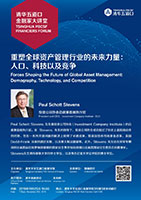
December 20, 2019
Setting Every Community Up for Retirement Enhancement (SECURE) Act of 2019 is signed into law. ICI educates members of both parties about provisions in the act and how they will be effective in helping Americans save for retirement.
ICI represents more than 31,000 funds with $34.5 trillion in assets, serving more than 100 million shareholders.
January 28, 2020
Stevens announces his plans to retire at the end of 2020 at the January meeting of the ICI Board of Governors. Stevens’s wife Joyce serves as hostess for her 14th and last ICI winter board meeting.
“I am immensely proud of the Institute’s many achievements during my time as its president and CEO. Over these years, we have transformed ICI into a truly global organization with world-renowned research and analytical capabilities that support our advocacy on behalf of funds and their shareholders.”
March 2020
COVID-19 reaches pandemic status. ICI begins to work remotely, and successfully maintains this shift through the end of the year, with plans to continue working remotely into 2021.
Summer 2020
An ICI working group conducts a wide-ranging study of the pandemic’s effect on the financial markets and how regulated funds and their investors reacted, coordinated with policymakers, and offered critical member services as the pandemic took hold.
July 24, 2020
ICI releases a white paper by ICI’s ESG Working Group seeking to promote greater public understanding of ESG investing and encourage the use of consistent terminology. The ICI Board of Governors unanimously endorses the roadmap and calls on member firms to incorporate the agreed-upon common terminology into their own public communications.
August 23, 2020
The Investment Company Act of 1940 turns 80.
October 1, 2020
ICI marks its 80th anniversary.
October 8, 2020
ICI expands its commitment to diversity and inclusion with a new industry survey and pipeline initiatives to help build a more diverse workforce.
1985 to 1989
Serves in senior government positions at the White House and Defense Department, including as special assistant for national security affairs to President Ronald Reagan and as chief of staff of the National Security Council.
1989
Awarded the Defense Department’s Medal for Distinguished Public Service, its highest civilian decoration
1990
Named US-Japan leadership fellow by the Japan Society and was resident in Tokyo, Japan.
1992
